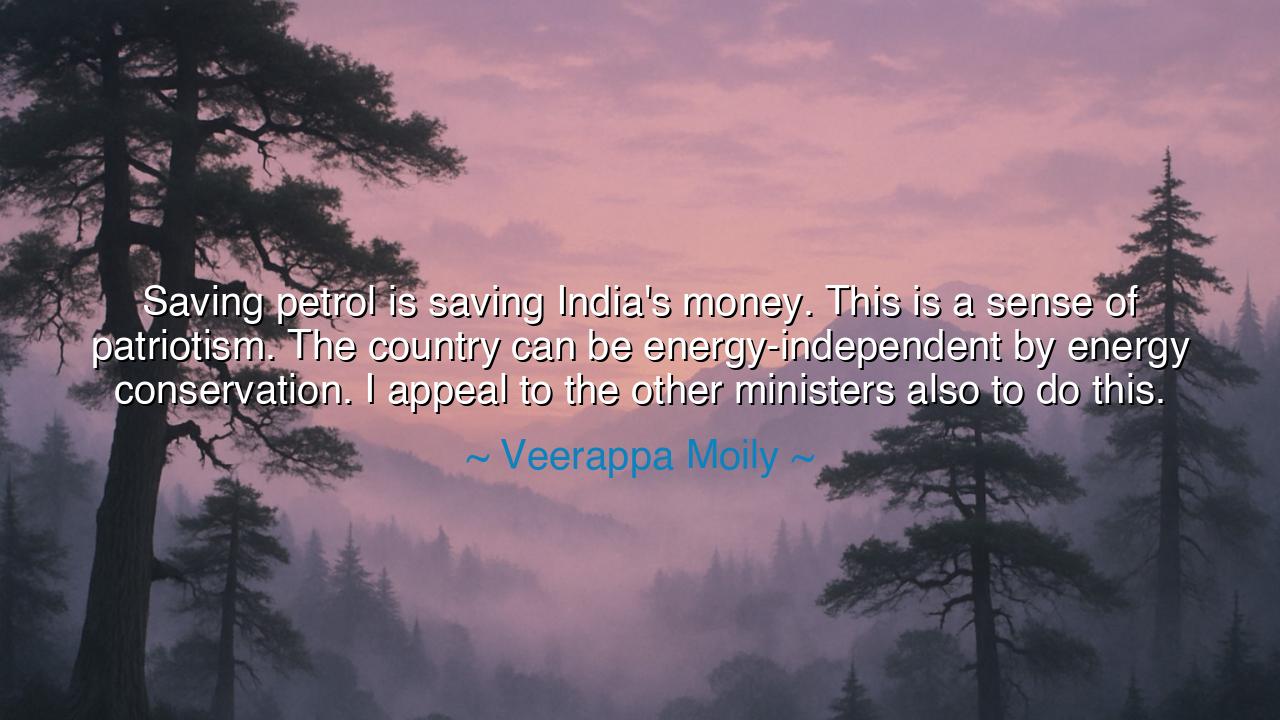
Saving petrol is saving India's money. This is a sense of
Saving petrol is saving India's money. This is a sense of patriotism. The country can be energy-independent by energy conservation. I appeal to the other ministers also to do this.






The words of Veerappa Moily—“Saving petrol is saving India’s money. This is a sense of patriotism. The country can be energy-independent by energy conservation. I appeal to the other ministers also to do this.”—resound as both wisdom and warning. They remind us that love for one’s country is not expressed only in great battles or heroic deeds, but also in the small and practical choices of daily life. To conserve energy, to save money, to reduce dependence on others—these are acts of quiet patriotism, rooted not in rhetoric but in responsibility. In these words, the minister calls upon the people to recognize that the true wealth of a nation is preserved when every citizen shows restraint, discipline, and foresight.
The ancients also taught that waste is the shadow of ruin. In the kingdoms of old, when granaries were neglected and resources squandered, famine and decline swiftly followed. Wise rulers, however, knew the value of conservation. Joseph in Egypt, as the scriptures recount, stored grain during years of plenty, and by his foresight, he saved his people during the years of drought. So too does Moily’s appeal echo this timeless truth: the future of a nation rests not only on what it produces, but on what it preserves. Energy conservation is not mere economy—it is the defense of tomorrow.
In India’s journey, the question of energy independence has always been one of survival and sovereignty. The nation has long depended upon the import of petrol, its lifeblood for transport, industry, and commerce. Yet every drop purchased from abroad is wealth flowing out, strength slipping away. To save petrol, therefore, is not just to save fuel—it is to save the dignity of the country, to reduce its vulnerability, and to ensure that the hard-earned money of the people builds schools, hospitals, and roads, rather than vanishing into foreign coffers.
History offers us shining examples of nations that understood this wisdom. During World War II, when resources grew scarce, the people of Britain practiced strict conservation. Lights were dimmed, rations imposed, petrol use restricted. These sacrifices, though small in the daily life of individuals, became acts of collective patriotism, enabling the nation to endure and prevail. Likewise, in Japan after the oil crises of the 1970s, the people embraced energy conservation with such vigor that it became a cultural discipline, transforming the nation into a leader in efficiency and technology.
Thus, Moily’s words rise beyond the moment of their utterance to carry a timeless lesson: that every citizen, through the discipline of conservation, becomes a guardian of the nation’s strength. Patriotism is not only waving the flag on ceremonial days; it is switching off the engine at a red light, it is walking or cycling when possible, it is choosing restraint over indulgence for the sake of the greater good. These small acts, multiplied across millions, become the pillars of a nation’s independence.
The lesson for us is clear. If we wish to see our country strong, prosperous, and self-reliant, we must learn to treat resources as sacred, not to be wasted but to be cherished. To squander fuel, to consume without thought, is to weaken the nation. But to conserve, to use wisely, to think of tomorrow—this is to practice true patriotism. The battlefield of today is not only on the borders, but in the choices we make with every flick of a switch, every journey we take, every drop of fuel we burn.
Practical action lies within reach. Walk when you can, share rides, embrace public transport. Turn off idle engines, save electricity, support renewable sources. Let ministers, leaders, and ordinary citizens alike set an example, for the call of patriotism belongs to all. Each act of conservation is a stone laid in the foundation of energy independence. Each drop saved is not merely fuel—it is the preservation of dignity, the strengthening of sovereignty, the proof of love for the motherland.
Thus, Moily’s appeal endures as a call not to arms, but to wisdom: saving petrol is saving India’s money. Let us pass this truth to future generations, that they may understand patriotism not only as sacrifice in war, but as discipline in peace. For the nation that guards its resources guards its future, and the people who conserve their strength will always walk the path of freedom.






AAdministratorAdministrator
Welcome, honored guests. Please leave a comment, we will respond soon